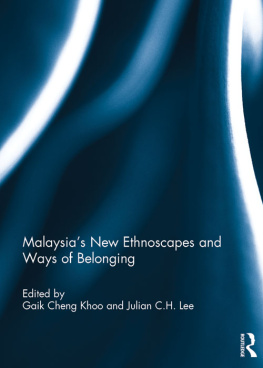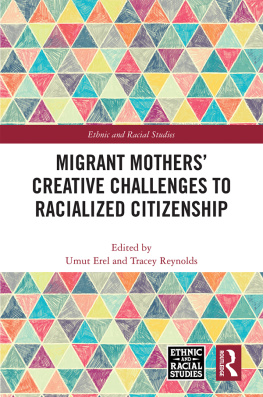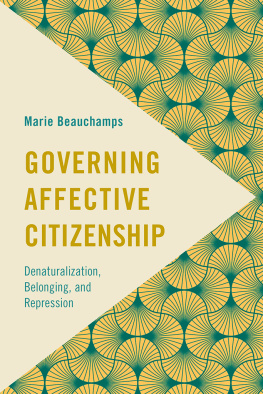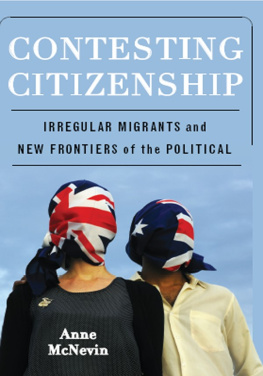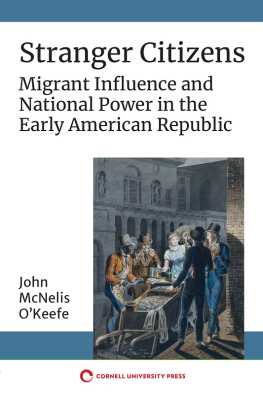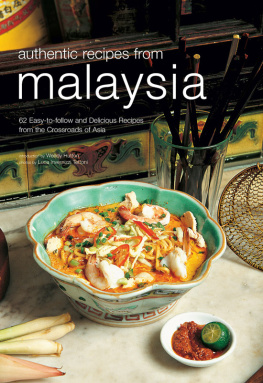Malaysias New Ethnoscapes and Ways of Belonging
This book provides a picture of a globalized Malaysia where its conventionally-conceived multi-ethnic composition of Malays, Chinese, Indians and Others rub shoulders with or interact more intimately on a daily basis with transnational ethnoscapes of migrant workers, asylum seekers, international students, and foreign spouses. It asks how, as Malaysians become wedded to their citizenship, they extend the same awareness of rights and claims to non-citizens such as African international students, the Indonesian maids who look after their children, and the Chins and stateless Rohingyas who populate the landscape as refugees and undocumented workers. What are the possibilities of forming cosmopolitan solidarities with non-Malaysians? And what are the newcomers strategies for place-making and belonging? And to bring the discussions of citizenship in Malaysia into relief, it is also asked how Malaysians abroad seek to enact and make meaningful their Malaysian citizenship. A diversity of experiences shapes the narratives in the chapters: of racialization, rejection, boundary-making and exclusivity, resilience and adaptation.
This book was published as a special issue of Citizenship Studies.
Gaik Cheng Khoo teaches Film and Cultural Studies at the University of Nottingham Malaysia Campus. She publishes on Malaysian film, food and identity.
Julian C.H. Lee is a Senior Lecturer in Global Studies, and member of the Centre for Global Research, RMIT University. He publishes on Malaysian civil society, democracy and multiculturalism.
Malaysias New Ethnoscapes and Ways of Belonging
Edited by
Gaik Cheng Khoo and Julian C.H. Lee
First published 2016
by Routledge
2 Park Square, Milton Park, Abingdon, Oxon, OX14 4RN, UK
and by Routledge
711 Third Avenue, New York, NY 10017, USA
Routledge is an imprint of the Taylor & Francis Group, an informa business
2016 Taylor & Francis
All rights reserved. No part of this book may be reprinted or reproduced or utilised in any form or by any electronic, mechanical, or other means, now known or hereafter invented, including photocopying and recording, or in any information storage or retrieval system, without permission in writing from the publishers.
Trademark notice: Product or corporate names may be trademarks or registered trademarks, and are used only for identification and explanation without intent to infringe.
British Library Cataloguing in Publication Data
A catalogue record for this book is available from the British Library
ISBN 13: 978-1-138-93790-1
Typeset in Times New Roman
by RefineCatch Limited, Bungay, Suffolk
Publishers Note
The publisher accepts responsibility for any inconsistencies that may have arisen during the conversion of this book from journal articles to book chapters, namely the possible inclusion of journal terminology.
Disclaimer
Every effort has been made to contact copyright holders for their permission to reprint material in this book. The publishers would be grateful to hear from any copyright holder who is not here acknowledged and will undertake to rectify any errors or omissions in future editions of this book.
Contents
Gaik Cheng Khoo
Sumit K. Mandal
Heng Leng Chee, Melody C.W. Lu and Brenda S.A. Yeoh
Avyanthi Azis
Timothy P. Daniels
Gerhard Hoffstaedter
Olivia Killias
Julian C.H. Lee
The chapters in this book were originally published in Citizenship Studies, volume 18, issue 8 (December 2014). When citing this material, please use the original page numbering for each article, as follows:
Chapter 1
Introduction: theorizing different forms of belonging in a cosmopolitan Malaysia
Gaik Cheng Khoo
Citizenship Studies, volume 18, issue 8 (December 2014) pp. 791806
Chapter 2
Arabs in the urban social landscapes of Malaysia: historical connections and belonging
Sumit K. Mandal
Citizenship Studies, volume 18, issue 8 (December 2014) pp. 807822
Chapter 3
Ethnicity, citizenship and reproduction: Taiwanese wives making citizenship claims in Malaysia
Heng Leng Chee, Melody C.W. Lu and Brenda S.A. Yeoh
Citizenship Studies, volume 18, issue 8 (December 2014) pp. 823838
Chapter 4
Urban refugees in a graduated sovereignty: the experiences of the stateless Rohingya in the Klang Valley
Avyanthi Azis
Citizenship Studies, volume 18, issue 8 (December 2014) pp. 839854
Chapter 5
African international students in Klang Valley: colonial legacies, postcolonial racialization, and sub-citizenship
Timothy P. Daniels
Citizenship Studies, volume 18, issue 8 (December 2014) pp. 855870
Chapter 6
Place-making: Chin refugees, citizenship and the state in Malaysia
Gerhard Hoffstaedter
Citizenship Studies, volume 18, issue 8 (December 2014) pp. 871884
Chapter 7
Intimate encounters: the ambiguities of belonging in the transnational migration of Indonesian domestic workers to Malaysia
Olivia Killias
Citizenship Studies, volume 18, issue 8 (December 2014) pp. 885899
Chapter 8
Jom Bersih! Global Bersih and the enactment of Malaysian citizenship in Melbourne
Julian C.H. Lee
Citizenship Studies, volume 18, issue 8 (December 2014) pp. 900913
For any permission-related enquiries please visit:
http://www.tandfonline.com/page/help/permissions
Gaik Cheng Khoo
School of Modern Languages and Cultures, Faculty of Arts and Social Sciences, The University of Nottingham Malaysia Campus, Semenyih, Malaysia
This article introduces this special issue on new ethnoscapes of a cosmopolitan Malaysia. It investigates questions of belonging and analyses the conditions that make possible cosmopolitan solidarity between citizens and sub- and non-citizens in a globalized world. I posit several critical frameworks on cosmopolitanism, citizenship and the public sphere to theorize the relationship between citizens and non-citizens in Malaysia: zones of sovereignty, the refugee as homo sacer and acts of citizenship that constitute rights and subjecthood for non-citizens. In an attempt to outline a more detailed ethnography of everyday ways of belonging, I touch briefly on Conradsons spaces of care. Lastly, I focus on the public sphere, which can be a barometer for gauging whether cosmopolitan solidarity and transnational crossings can occur.
Introduction
A walk on the streets of Kuala Lumpur in the new millennium reveals diverse new ethnoscapes (Appadurai 1996), the visibility and sonority of which exceeds the common ethnic face and voice of Malaysia, namely the three main ethnicized groups of Malay, Chinese and Indian (Holst 2012). Workers from Indonesia, Philippines, Myanmar and Nepal, students from Iran, Nigeria and China, Japanese senior citizens and many others come to Malaysia to study, work, escape political turmoil, to retire or to marry and eventually settle. Such diverse new ethnoscapes reflect Malaysia as a full participant in global modernity where Malaysia becomes subject to the flows of transnational movement, labouring and settlement. But rather than regard this population as merely transient, this special issue examines the complex dynamics within and among ethnoscapes or groups to understand how the mobility of members of such groups might be flexible or inflexible depending on their visa status, class, age, gender and nationality. It investigates questions of belonging and analyses the conditions that make possible cosmopolitan solidarity between citizens and sub- and non-citizens in a neoliberal era whereby the space for problematizing the human is a milieu constituted by a nexus of multiple ethical regimes such as citizenship, moral systems and NGO interventions (Ong 2006, 197).

